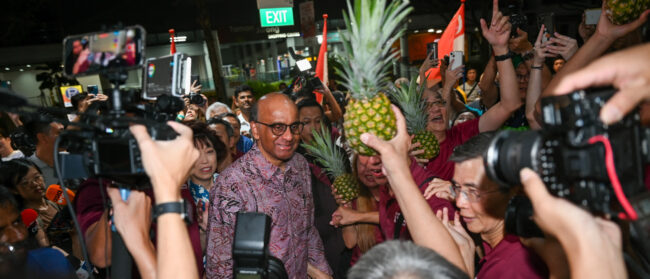Social media giant Twitter last week blocked nearly one thousand accounts linked to the Royal Thai Army, which were in violation of its policies on manipulation of information. According to a statement released by Twitter, the accounts were “engaging in amplifying pro-RTA and pro-government content, as well as engaging in behavior targeting prominent political opposition figures”.
Some of those figures included now-banned opposition leader Thanathorn Juangroongruangkit of the defunct Future Forward Party.
A study the same week by the Stanford Internet Observatory showed that many of the accounts, more than two-thirds of them, had never tweeted or had little to no engagement. Much of the activity occurred around the end of 2019 and corresponding with the Royal Barge Procession, which marked the coronation of King Vajiralongkorn and after the February 2020 Korat shooting, where a soldier killed 30 people and injured 57 in a shopping mall in Nakhon Ratchasima Province. Activity also increased during the disbanding of the Future Forward Party in late February. Twitter also took down accounts linked to the governments of Iran, Saudi Arabia, Cuba and Russia.
However, the news should come as no surprise to Thailand watchers. The regime has consistently used disinformation, so-called “fake news” and other malicious forms of information as a political tool of repression and authoritarian consolidation since the May 2014 military coup d’état that swept former Royal Thai Army chief Gen. Prayut Chan-o-cha into power.
The government has attempted to define what it is and what is not considered “fake news” and has increased tools of legal harassment against those it deems to have disseminated information critical to its survival. Deputy Prime Minister Gen. Prawit Wongsuwan debated charges over an article deemed defamatory where he was characterised as a “crazy rich Asian” and those involved were threatened with violation of Thailand’s draconian Computer Crime Act. The story was one of several on Prawit’s watch scandal, and did little additional damage to his public image, tarnished by allegations of corruption and extravagant spending.
In the years and months after the 2014 coup, social media became a more comfortable place to voice criticisms of their government. According to statistics, Thailand has now more than 49 million Facebook users. However, the regime has used tools of authoritarian repression to control more prolific users, like Pravit Rojanaphruk, a journalist who was detained and interrogated in 2015 for his critical comments.
Spaces have opened for artists to critique the regime, evidenced by the famous anti-Prayut rap song, prathet ku mi (what my country’s got). Eventually, the government arrested one of the musicians for involvement in the current anti-government protests. The use of social media can level the playing field for Thai society, which is a democratising influence for opposition figures and activists. Thanathorn is one of the opposition figures to tap into Thailand’s adept social media prowess, amassing more than 1.6 million Facebook fans, despite his recent ban from Thai politics.
In response, the Thai Government has tried to exercise total control over social media, restricting social media posting before the 2019 elections or instructing candidates not to “like” or share posts spread “false information”. The government set up a special committee run by the Election Commission to monitor online campaigning.
Thailand subsequently cracked down on people claiming that two election commissioners had been fired. Nine people were arrested for these claims and for suggesting that 600,000 illegitimate ballots had been counted. In July 2019, Thailand’s Digital Economy and Society Minister Puttipong Punnakanta set up a “Fake News Center” in cooperation with the Royal Thai Police, the military, as well as the Consumer Protection Board. It also recently targeted Facebook, Twitter and Google in an attempt to remove posts it deemed threatening to Thailand’s monarchy.
The military junta also taken institutional and legislative measures. It enacted a 2019 cyber security law that granted sweeping powers to access online data and arrest individuals without warrants for computer crimes. The government has attempted to become the final arbiter in online disputes and challenging those who they deemed to be spreading disinformation. Prior to the death of King Bhumibol Adulyadej, it mobilised young people in 2016 to reign in individuals who it deemed in violation of its harsh lèse majesté laws, which can result in several years in prison for defaming or insulting the Thai monarchy.
In the new disinformation age, it is not only the government who is attempting to control the flow of information and become the arbiter of truth
Almost immediately after the 2014 coup, it updated the Computer Crime Act, regardless of legitimate concerns expressed by the international community, civil society and the Thai business community, to give law enforcement greater authority to monitor online activity. Ad-hoc groups and vigilante groups have also popped up online, which have been overtly critical of human rights activists or political opposition figures. Right-wing media has flourished, painting dissenters with traitorous labels.
While the era of disinformation feels confined to the modern era, it has been a long-established pattern in Thailand that dates back almost two decades. Disinformation campaigns began during the Thaksin Shinawatra era, where right-wing media would repeatedly paint him with treacherous labels and with accusations of trying to destroy the monarchy or erode the legitimacy of King Bhumibol.
Thailand first passed the now-ubiquitous Computer Crime Act in 2006, which authorised authorities to block internet content deemed misinformation or harmful to national security. In that space, lèse majesté became routine. Modern right-wing groups surfaced, such as the ultra-royalist Rubbish Collection Organization (RCO), who would list the profiles of targets on their Facebook page for online bullying purposes or turned over to authorities for potential charges.
This online vigilantism continued into the age of the current military-backed government, where the RCO continues to operate and where the Royal Thai Army set up its Cyber Center to suppress information deemed harmful or charge violators under Section 112. In the recent past, where information could not be curtailed online, violators would be summoned to a military facility for “attitude adjustment”.
In the new disinformation age, it is not only the government who is attempting to control the flow of information and become the arbiter of truth. Some Thai people have fallen prey to vindictive other citizens who have turned them in for violations of lèse majesté or other computer crimes.
Social surveillance became routine in the difficult period surrounding the death of King Bhumibol in October 2016. As Thailand becomes more polarised as a result of competing views about the direction of the country and the future of the monarchy, disinformation, harassment, trolling and other predatory behaviour will likely remain commonplace. The Royal Thai Army’s largely unsuccessful campaign is just the beginning.
Mark S. Cogan is an Associate Professor of Peace and Conflict Studies at Kansai Gaidai University in Osaka, Japan. He is a former communications specialist with the United Nations in Southeast Asia, Sub-Saharan Africa, and the Middle East.


